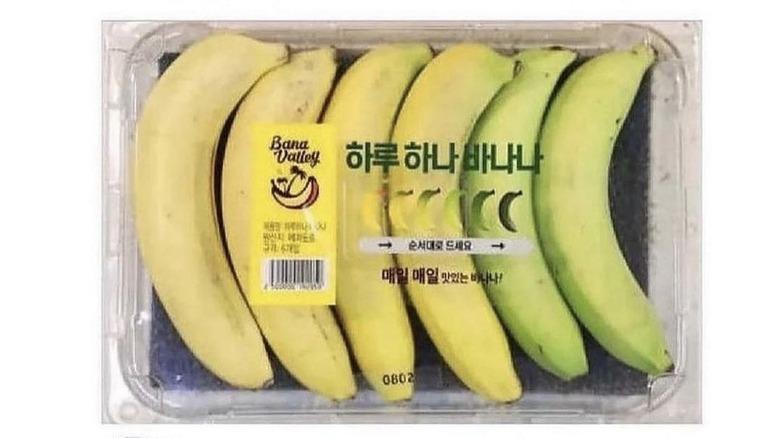How Padma Lakshmi Just Made Environmentalists Very Unhappy
Imagine that you're out on your weekly grocery shop and need to buy enough bananas to last you until the next one. The only problem is that half of the bananas are probably going to turn brown long before you get round to eating them. This is because, like most fruits, bananas have a short window of optimal ripeness. You can be storing unripe green bananas one day and before you know it, they have turned to an off-putting brown. Wait too long and you've entirely missed the small window of perfectly yellow bananas!
Leaf explains that bananas contain an enzyme known as polyphenol oxidase which reacts with oxygen in a way that causes the fruit to start browning. There are ways to prevent bananas from oxidizing as quickly as they do — using lemon juice, sulfuric preservatives, and the likes — but a certain country seems to have found a more ingenious solution.
According to a tweet posted by Padma Lakshmi, the "Top Chef" host is amazed by the way in which bananas are sold in South Korea. Certain stores, it turns out, sell packs of bananas wherein each banana is at a different stage of ripeness. Known as "one-a-day" bananas, this packing solution guarantees that you have a perfectly ripe banana to eat every day. Lakshmi's fans, however, are noticing a bit of a problem with this concept.
The jury is out over ripe bananas at the cost of plastic waste
Some are seriously impressed with the one-a-day bananas, "Ppl are light years ahead of the USA in other parts of the world," wrote one user. But for others, the problem lies in the plastic containers that the food is stored in. The general consensus seems to be that this concept would be much better if it didn't involve selling the bananas in plastic. As one user weighed in, "upside = bananas are easier to consume at the desired stage of ripeness, downside = more plastic packaging probably winding up in landfills. It's probably better for the environment to waste a few bananas than generate more plastic use."
Redditors discussing the one-a-day banana concept also seem to agree that it would be much better if the plastic was cut out of the equation. Waste from over-ripened bananas that get thrown out, users say, is better than the waste that all the plastic would create. "The plastic is excessive and you're honestly better off throwing away a bad banana (easily solved by buying less bananas and just having to forgo a banana or two) than a plastic clamshell each week," one Redditor shared.
Some think that the concept is so brilliant, however, that other fruits that have a notorious temperament for ripening should be sold this way too — think avocados. As for others, they'd rather buy bananas as they currently do (without the plastic) and stick to making a loaf of classic banana bread with overripe bananas each week!

